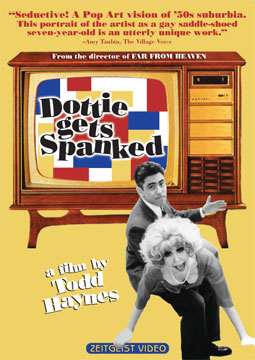

Reviews of Recent Independent, Foreign, & Documentary Films in Theaters and DVD/Home Video
Directed by: Todd Haynes. Produced by: Christine Vachon & Lauren Zalaznick. Written by: Todd Haynes. Director of Photography: Maryse Alberti. Edited by: James Lyons. Music by: James Bennett. Released by: Zeitgeist. Country of Origin: USA. 27 min. Not Rated. With: Evan Bonifant, Barbara Garrick, Julie Halston, Robert Pall, Harriet Harris & Adam Arkin. DVD Features: Audio commentary by Todd Haynes. "He Was Once" short film co-starring Todd Haynes. Photo gallery. English subtitles.
In 1993 - before 2002's Far from Heaven, an homage to the melodramatic films of
Douglas Sirk - Todd Haynes wrote and directed this withering mini-portrait of 1960s suburban
pop culture. Told from the perspective of Steven, played with simultaneous self-awareness and
bumbling self-discovery by Evan Bonifant, this understatedly perceptive movie depicts this
six-year-old boy's fascination with TV star Dottie Frank (Julie Halston, in a slightly exaggerated
incarnation of Lucille Ball). Obsessive Steven fills his coloring
books with drawings of Dottie. He is laughed at by the girls at school for sharing the same
interests, while his perplexed father disapproves of his fascination with the sitcom star. Steven's
other fixation, spanking, manifests itself in his dreams - bizarre black-and-white sequences where
Steven is king having command over Dottie.
Haynes has a love/hate relationship with the gender and sexual boundaries that are a huge part of
popular culture. Throughout Dottie, there is an unarticulated undercurrent stressing the
arbitrariness of social mores. This imbues the film with an ambivalence that may be Haynes'
defining directorial characteristic.
DVD Extras: "He Was Once," the 1989 short directed by Mary Hestand, examines
cultural norms, spoofing the 1960s TV show Davey and Goliath. The movie jokily
subverts the family structure, using live-action to portray a clay-motion cast; adults as children
and children as adults; and the playing out of a patriarchal rivalry also hinted at in
Dottie.
In fact, according to Haynes in his commentary, Dottie has its basis in Freudian
psychoanalysis. The film deals with such notions as the childhood "mirror stage." They are
incomprehensible, despite Haynes' explanations. Nevertheless, he provokingly discusses
distinguishing between spanking and beating, and his purposely atmospheric blurring of fantasy
and reality. Most shocking though, is Haynes' statement that not only was Lucille Ball's ditzy
persona at odds with her industry power (similar to what is seen of Dottie), but that Lucy was
spanked numerous times by her husband on her own show. Reymond Levy
|